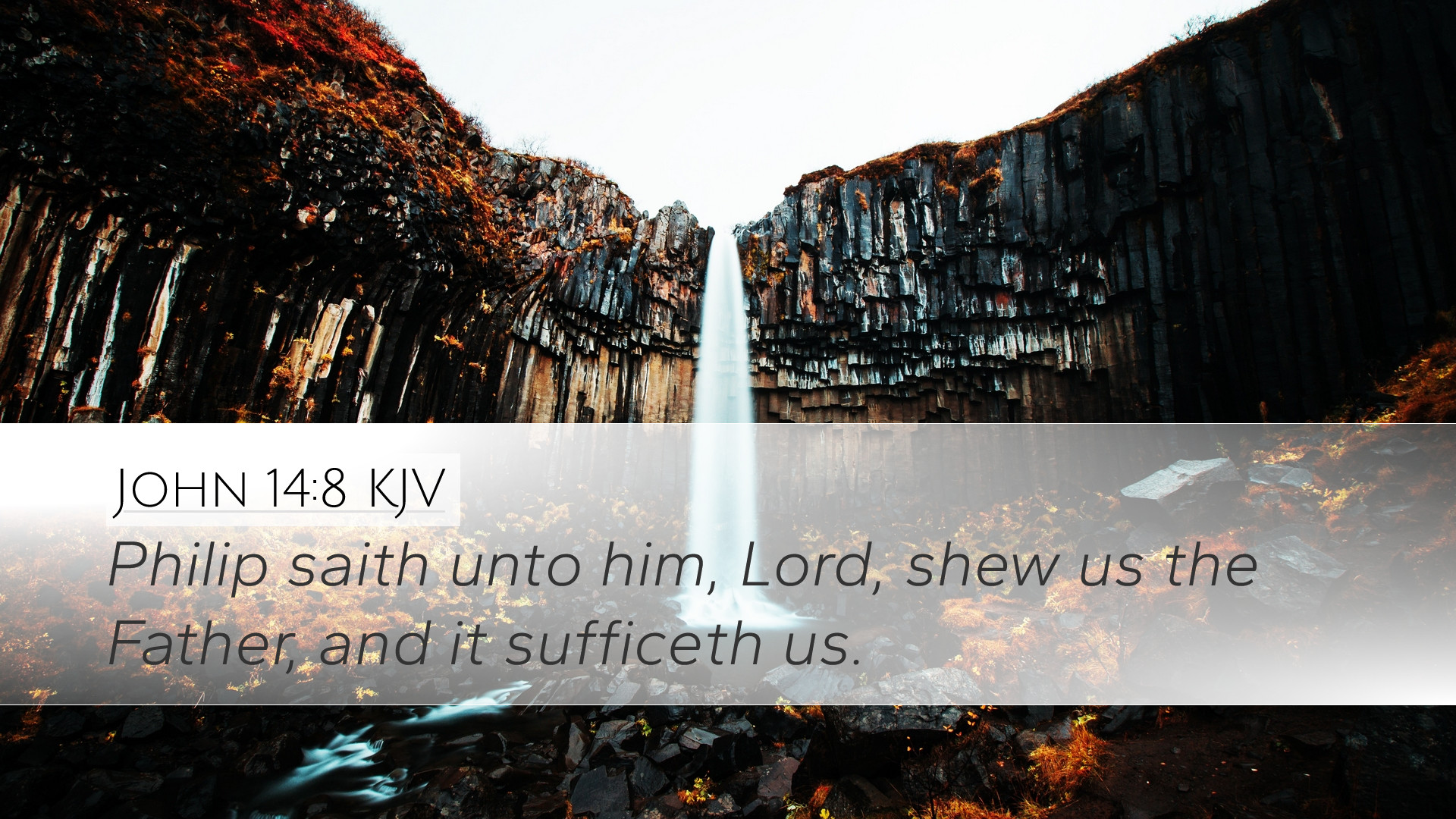Commentary on John 14:8
In the Gospel of John, chapter 14 verse 8 marks a pivotal moment in Jesus' discourse with His disciples. Here, Philip addresses Jesus, saying, "Lord, show us the Father, and it is enough for us." This request reveals significant theological and existential inquiries, pivotal to understanding the nature of Christ and the Godhead. Below is a synthesized commentary based on insights from various public domain sources to enrich the understanding of this verse.
Contextual Background
To fully grasp the implications of Philip's request, it is crucial to consider the surrounding context. In the preceding verses, Jesus comforts His disciples, revealing His intimate relationship with the Father and assuring them of His divine nature. Philip's desire to see the Father reflects a longing for confirmation and assurance amidst the uncertainty of Jesus’ impending departure.
Theological Implications
The request "show us the Father" implies several key theological points:
- The Unity of the Father and the Son: Philip's inquiry underscores the relational dynamics within the Trinity. Jesus responds by indicating His unity with the Father, emphasizing that seeing Him equates to seeing the Father (John 14:9).
- Human Limitations in Understanding God: This request also reflects humanity's struggle to comprehend the unseen God. Philip’s eagerness for a visible representation of God echoes the themes of faith and belief central to Jesus’ ministry.
- Revelation and Relationship: Jesus’ presence is a revelation of God’s character and nature. The request for vision invites further reflection on how Jesus embodies the fullness of the Godhead.
Insights from Commentators
Matthew Henry
Henry notes the earnestness of Philip’s request, pointing out that it arises from a place of genuine need. He emphasizes the spiritual yearning of the disciples to know God more intimately. Henry suggests that Philip's request is a reflection of the human desire for tangible proofs of faith, which is a common theme throughout the scriptures.
Albert Barnes
Barnes examines the implications of Philip's statement as an indication of the disciples' still limited understanding of Jesus’ mission. He argues that Philip, like many of the disciples, has not fully realized that the presence of Jesus among them is the fullest revelation of God. Barnes highlights that the request is profound not just in its simplicity but also in its invitation for deeper spiritual knowledge through Christ.
Adam Clarke
Clarke provides a thorough analysis of Philip's character, suggesting that his request reflects both a passionate faith and an incomplete understanding of the divine. He challenges readers to consider how often believers seek visible affirmations of God's presence, similar to what Philip exhibited. Clarke elaborates on the significance of Christ as the visible God who reveals the Father and invites believers into a relationship characterized by faith rather than sight.
Application for Believers
In reflecting on John 14:8, believers are encouraged to consider their own requests for God's presence in their lives. Philip’s plea can spur important self-examination regarding faith:
- Desire for Intimacy: How do we cultivate a desire to know God more deeply and personally in our spiritual journeys?
- Faith Over Sight: In what ways can we exercise faith in God's unseen presence, trusting His guidance even in uncertainty?
- Understanding of Christ: How does our understanding of Christ as the embodiment of the Father shape our relationship with God today?
Conclusion
John 14:8 serves not only as a narrative moment of inquiry but also as a profound theological assertion regarding the nature of Christ and His relationship with the Father. By drawing insights from historic commentaries, we are reminded of the ever-relevant struggle for deeper understanding and the privilege of knowing God through Christ. This verse calls all believers—pastors, students, and theologians alike—to embrace the mystery of faith while seeking a fuller revelation of the divine in their lives.


